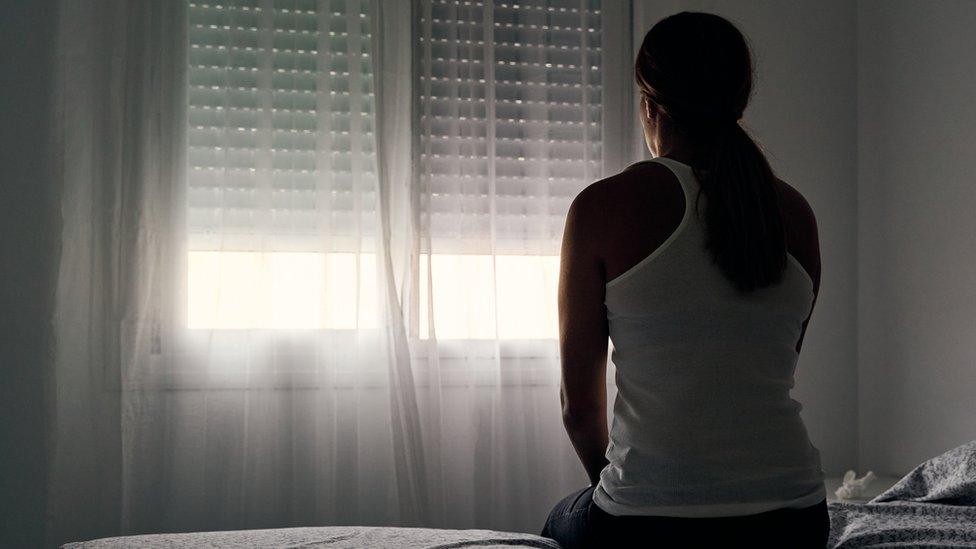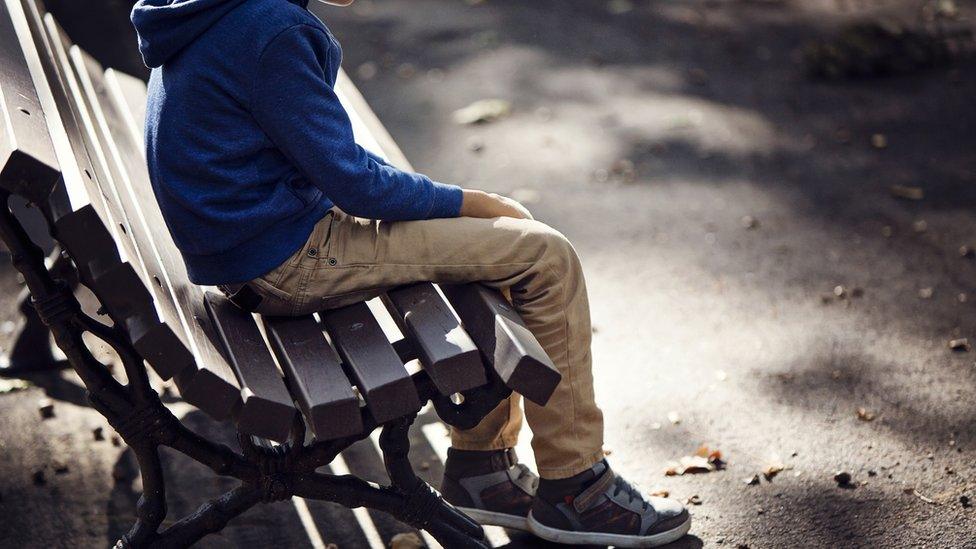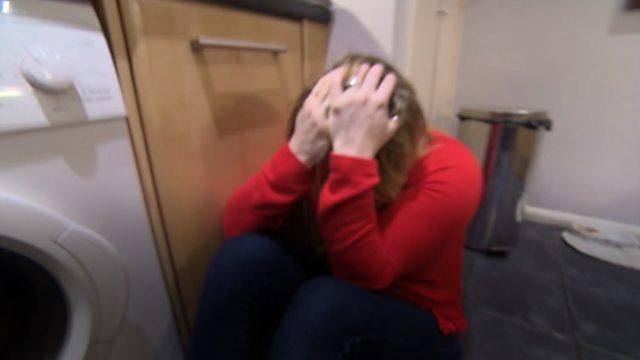Parents abused by their children forced to leave jobs
- Published

Sarah said her son often has violent outbursts towards himself and others
Parents abused by their children are having to leave their jobs due to gaps in support, a group has said.
Parental Education Growth Support (PEGS) said hundreds of families were being hit financially because they had no-one to look after their children.
One self-employed mum from Birmingham said she had turned down work because of her 10-year-old's violent outbursts.
Sarah said she had been waiting six years for a diagnosis that would enable support from his school and doctors.
PEGS, based in Shropshire, works with around 3,000 families across the country whose children are abusive and said 70% of parents had either reduced their hours or left their jobs because of the daily turmoil.
"The financial effects are only one aspect of the whole picture - with physical, verbal, coercive, emotional, digital and even sexually abusive behaviours also occurring behind closed doors," Michelle John, director, said.

Parents face physical, verbal and in some cases sexual abuse from their children
Sarah said she thought her son was just a bit boisterous - until he was expelled from school at the age of four.
She said she was sent "an inch thick booklet of witness accounts of what my child had done", which included splitting a teacher's lip with a piece of Lego and stabbing a child's arm with scissors.
"I was made to feel like a criminal - I felt shame, not knowing what my son was doing," she said.
It was the catalyst for Sarah to start trying to get help for her son, who she believes has additional needs.
She initially contacted her GP and while they and her local mental health team had been supportive, she said she had been waiting years for a diagnosis from her local health trust which could pave the way for an education, health and care plan.
Earlier this year it was reported some children are waiting for five years to have diagnoses for special educational needs, external, including ADHD and autism.
Sarah said she still had no answers on her son's condition but that his behaviour was often so destructive it felt like "coming home to an abusive husband".
Now 10, she fears he will only get worse as he gets bigger and stronger, and that he even throws furniture at her.
Sarah said she loved her son unconditionally and just wanted him "to have the care that we should all expect".
"I have had to turn down job opportunities. I work when I can but he is refusing to go to school now so I have had to turn down work to look after him," Sarah said.
"He's been an open wound for years," she said.

Sarah's son, who is now ten, was expelled from school when he was four-years-old
Although child-to-parent abuse is now recognised within the Domestic Abuse Act 2021, PEGS said there are not comprehensive policies and frameworks across regional and national organisations.
The work of PEGS was highlighted in 2021 when it emerged more than 300 parents said they were being abused by their own children and had sought help from the charity, which was set up in lockdown.
They describe themselves as a not-for-profit organisation, external which relies on income from professional training and donations from funders in order to support families impacted by child-to-parent abuse.
Ms John said their work had grown exponentially since and they were seeing around 70 new cases every week.
"In this current financial climate, it's especially important that employers - across the public, private and voluntary sectors - understand that staff and service users may be living in abusive situations," she said.
PEGS works closely with the Department for Work and Pensions, which supports the charity's Employer Covenant. It encourages businesses to have policies and practices to help staff and service users suffering with this form of abuse.
A Department for Education spokesperson said while councils are "responsible for providing the right support for children in their areas," there is variation in how the system worked across the country.
They added: "Proposals in our SEND and alternative provision green paper, external will create a fairer, more inclusive system including in mainstream schools.
"We are putting unprecedented investment into the high needs budget, meaning it will be worth £9.7 billion by 2023-24, as well as creating tens of thousands of new school places for children with SEND or who require alternative provision over the next three years."
A Birmingham Community Healthcare spokesperson said work was continuing to improve waiting times for children referred to the neurodevelopmental services, that had been exacerbated by the pandemic and redeployments.
Neurodevelopmental conditions affect the physical and, sometimes, learning abilities of a child, external and the healthcare's services assesses children and young people for disorders such as autism spectrum disorder and attention deficit hyperactivity disorder.
They added that some extra money was allocated to them to engage third party providers to do assessments for particular cohorts of children.

Follow BBC West Midlands on Facebook, external, Twitter, external and Instagram, external. Send your story ideas to: newsonline.westmidlands@bbc.co.uk, external
Related topics
- Published17 December 2020

- Published7 August 2019

- Published23 April 2020
